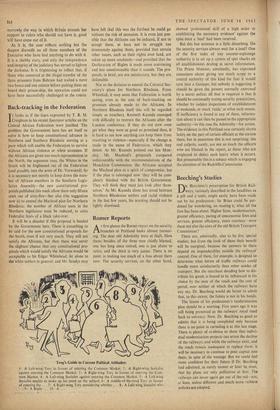Beeching's Studies
DR. BEECIIING'S prescription for British Rail- ways, variously described in the headlines as a pill and a tonic, might easily have been made out by his predecessor; Sir Brian could be par- doned for wondering, on reading it, what all the fuss has been about. Higher fares, modernisation, greater efficiency, paring of uneconomic lines and services, greater efficiency, more courtesy—were these not also the aims of the old British Transport Commission?
There are, admittedly, also to be five special studies; but from the look of them their benefit will be marginal, because the answers to them depend on imponderables outside. the railways' control. One of them, for example, is designed to determine what forms of traffic railways could handle more satisfactorily than other modes of transport. But the merchant deciding how to dis- tribute his goods is bound to be influenced in his choice by the state of the roads and the cost of petrol, over neither of which the railways have any say. Dr. Beeching would do better to admit that, to this extent, the future is not in his hands.
The lesson of his predecessor's modernisation plan should be a warning. Five years ago it was still being presented as the railways' royal road back to solvency. Now, Dr. Beeching as good as admits that it is being completed only becatise there is no point in curtailing it at this late stage.
There is plenty of evidence to show 'that indivi- dual modernisation projects can arrest the decline of the railways; and while the railways exist, and the roads remain inadequate to replace them, it will be necessary to continue to pour capital into them, in spite of the wastage. But we could feel more confident for their future if Dr. Beeching had admitted, as surely sooner or later he must, that his plans are only palliatives at best. The railways can never again get out of the red -- not, at least, unless different and much more ruthless policies are adopted.










































 Previous page
Previous page